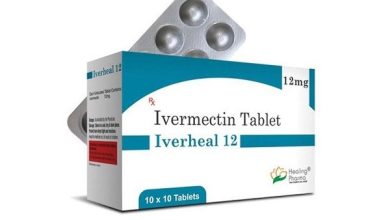Seek medical attention if any symptoms occur after using oxycodone
Before using any medication, be sure to tell your doctor about any medical conditions or allergies you may have

Seek medical attention if:
- slow heartbeats;
- the confusion;
- extreme constriction of the pupil;
- dizziness;
- muscle flaccidity (soft muscles);
- des hallucinations;
- an inability to walk normally;
- cold, clammy skin;
- slow or difficult breathing;
- extreme drowsiness;
- a bluish tint to the lips.
- Consult your doctor if you notice any symptom that worries you while using this medication.
Are there any other precautions or warnings?
Before using any medication, be sure to tell your doctor about any medical conditions or allergies you may have,
the medications you use, and any other important facts about your health. Women should mention if they are pregnant or breastfeeding.
precautions
Accidental use: When oxycodone is used by someone for whom it was not prescribed, the effects of the medication can be fatal.
Children are particularly at risk.
Abdominal conditions: Oxycodone and other narcotic medicines can make the diagnosis of
abdominal conditions more difficult and they can make these conditions worse
If you have abdominal issues, talk to your doctor about how this drug may influence your health and how that condition may affect
how much of this medication to take and how successful it will be, and whether any medical supervision is needed. specific.
Medical conditions: if you have an abnormal heartbeat, low blood pressure,
reduced adrenal function, reduced thyroid gland function, or inflammation of the pancreas,
an enlarged prostate, or a narrowing of the urethra, the use of oxycodone may make the symptoms of your condition worse or worse.
Talk to your doctor about how this medicine may affect your medical condition,
how your condition may affect the dosing and effectiveness of this medication,
and whether any particular precautions need to be taken.
Alcohol and other drugs that cause drowsiness:
Do not drink alcohol while taking this drug as serious side effects may occur.
You should avoid, if possible, using other drugs that cause drowsiness or
slow breathing as an accumulation of potentially dangerous side effects may occur .
Stopping the drug:
Do not suddenly stop using this drug, as withdrawal symptoms may occur.
These symptoms may include body aches, diarrhea, nausea, nervousness, restlessness, runny nose, sneezing, goosebumps, shaking,
shaking, stomach cramps, rapid heart rate, fever, sweating, or confusion.
Your doctor will give you instructions on how to safely stop using this medication if you no longer need it for pain control.
Head injuries: Oxycodone can cause increased intracranial pressure.
If you sustain a head injury or have a condition that increases your pressure in the skull,
discuss with your doctor how this medication may affect your medical condition,
how your medical condition may affect dosing and efficacy of this medicinal product, and the need for specific medical supervision.
Constipation: Regular use of opioid (narcotic) pain relievers frequently results in constipation.
Your doctor will discuss the use of stimulant and lubricating laxatives with you
and any other arrangements you may need to make.
When oxycodone is used properly for pain relief, there is no need to be concerned about the possibility of abuse.
Physical dependence or tolerance has been associated with taking narcotic painkillers such as oxycodone.
Withdrawal symptoms may be experienced if the dose is drastically reduced or stopped abruptly.
A gradual reduction in the dose under medical supervision may help prevent or reduce these withdrawal
symptoms when the use of this medicine is no longer necessary for the treatment of pain.
If oxycodone is stopped suddenly, you may experience withdrawal symptoms
If after prolonged use of this medication you no longer need it for pain management,
you should gradually discontinue its use as directed by your doctor.
warnings
Breathing difficulty: Buy Oxycodone online can cause serious breathing problems, especially for people
who have an acute asthma attack and for those with chronic obstructive pulmonary disease
or other conditions that affect to breathing.
If your breathing slows or you notice difficulty breathing, seek medical attention immediately
If you have lung problems and are taking other medications that can slow breathing,
you are at increased risk for this complication.
People with asthma or bronchitis should discuss with their doctor how this medication may affect their medical condition,
how their medical condition may affect the dosing and effectiveness of this medication,
and whether any specific medical supervision.
Uncontrolled pain: If your pain is not relieved by a normal dose of oxycodone, consult your doctor.
Do not increase the amount you take of this medicine without first seeking the advice of a doctor.
Liver function: This medicine may build up in the body and result in negative effects if there is liver disease or impaired liver function.
Discuss with your doctor how this drug may influence your medical condition,
how your medical condition may affect the administration and effectiveness of this medication,
and whether any special medical care is necessary if you have substantially impaired liver function.
Kidney function: When this medicine builds up in the body due to kidney disease or reduced kidney function, adverse effects can result.
If you have severely reduced kidney function,
discuss with your doctor how this medication may affect your medical condition,
how your medical condition may affect the dosing and effectiveness of this medication,
and whether any specific medical supervision.
Medical Supervision:
Drowsiness or reduced alertness: The use of oxycodone may impair the mental and
physical abilities necessary for certain activities such as driving a car or operating machinery.
Do not drive a motor vehicle or perform other potentially hazardous tasks if this medication prevents you from doing so safely.
Serotonin syndrome: Although rare, serious reactions are possible when oxycodone is combine with other drugs that affect serotonin
such as tricyclic antidepressants and serotonin reuptake inhibitors, drugs for treatment of depression.
If possible, these combinations must avoid. Symptoms of a reaction include muscle stiffness and spasms, difficulty moving, altered mental status –
including delirium and restlessness. Coma and death are possible.
If you are taking antidepressants, discuss with your doctor how this medication may affect your medical condition,
how your medical condition may affect the dosing and effectiveness of this medication, and whether any medical supervision is necessary.
Avoid Medicine If You Are:
Pregnancy: This medication should not be used during pregnancy.
Women who used oxycodone during pregnancy gave birth to children showing signs of withdrawal.
If pregnancy occurs while using this medicine, contact your doctor immediately.
Breast- feeding: It is not known if oxycodone passes into breast milk.
If you take this medicine while you are breastfeeding, your baby may feel the effects.
Consult your doctor to find out if you should continue breastfeeding.
Children: Neither the safety nor the effectiveness of this medication has been established for children under 18 years of age.
Accidental ingestion of this medicine by a child can have serious or even
fatal consequences. Keep this medicine out of the reach of children.
Seniors: Seniors are probably more sensitive to the effects of this drug.
Can other agents interact with this drug?
There may be an interaction between oxycodone and any of the following agents:
- ergot alkaloids (e.g. ergotamine, dihydroergotamine);
- the alcohol;
- amiodarone;
- amphetamines (e.g. dextroamphetamine, lisdexamfetamine);
- calcium antagonists (eg amlodipine, diltiazem, );
- macrolide antibiotics (eg clarithromycin, erythromycin);
- tricyclic antidepressants (eg amitriptyline, desipramine,
- antifungals that end in “azole” (eg, itraconazole,
If you want to read more click





